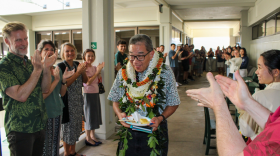A bill signed by President Joe Biden could pave the way for a National Museum of Asian Pacific American History and Culture.
For several years, advocates have pushed for a national museum that honors and celebrates Asian American, Native Hawaiian and Pacific Islander history and culture. They say their history is a big part of America’s history.
The bill, championed by New York Rep. Grace Meng, establishes an eight-member commission to study the feasibility of creating a museum. The U.S. House and Senate passed the measure in April and May, and Biden signed it into law last month.
Members of Congress will need to appoint commissioners, who will serve as volunteers, by mid-September. They will be tasked with creating a plan of action to submit to Congress and Biden 18 months after the commission’s first meeting. The report would include recommendations on best practices for engaging communities, a legislative plan and estimated costs. They also have the option to convene a national conference to gather community stakeholders to discuss the museum.
The National Museum of African American History and Culture was also created through a congressional act. And federal legislation passed in 2020 will pave the way for the National Museum of the American Latino. Both are housed within the Smithsonian Institution.
“This museum will rightfully acknowledge the hard work, service and sacrifice of AANHPIs for the United States and celebrate the diversity we bring to communities across the nation,” U.S. Rep. Kai Kahele said in a statement. “This museum will be a powerful educational tool to combat the surge of anti-Asian hate and violence we face.”
Hawaiʻi is home to the largest Asian American, Native Hawaiian and Pacific Islander communities in the country.
According to 2020 Census data, Asian Americans make up about 57% of Hawaiʻi’s population. And Native Hawaiians and Pacific Islanders comprise 27%. Those numbers are for Hawaiʻi residents who are Asian, Native Hawaiian and Pacific Islander alone or in combination with other ethnicities.
In a release, U.S. Sen. Mazie Hirono, the first Asian American woman elected to the Senate, said AANHPI communities “have largely been excluded or erased from American history for years.”
“We are often pejoratively depicted as foreigners, instead of people who have lived in and positively contributed to this country for generations – narratives which have fueled xenophobia and prejudice, contributing to decades of racist laws and discrimination,” Hirono said. “Establishing a National Museum of Asian Pacific American History and Culture would help combat these harmful narratives by helping us to better understand each other and our shared history as Americans.”






